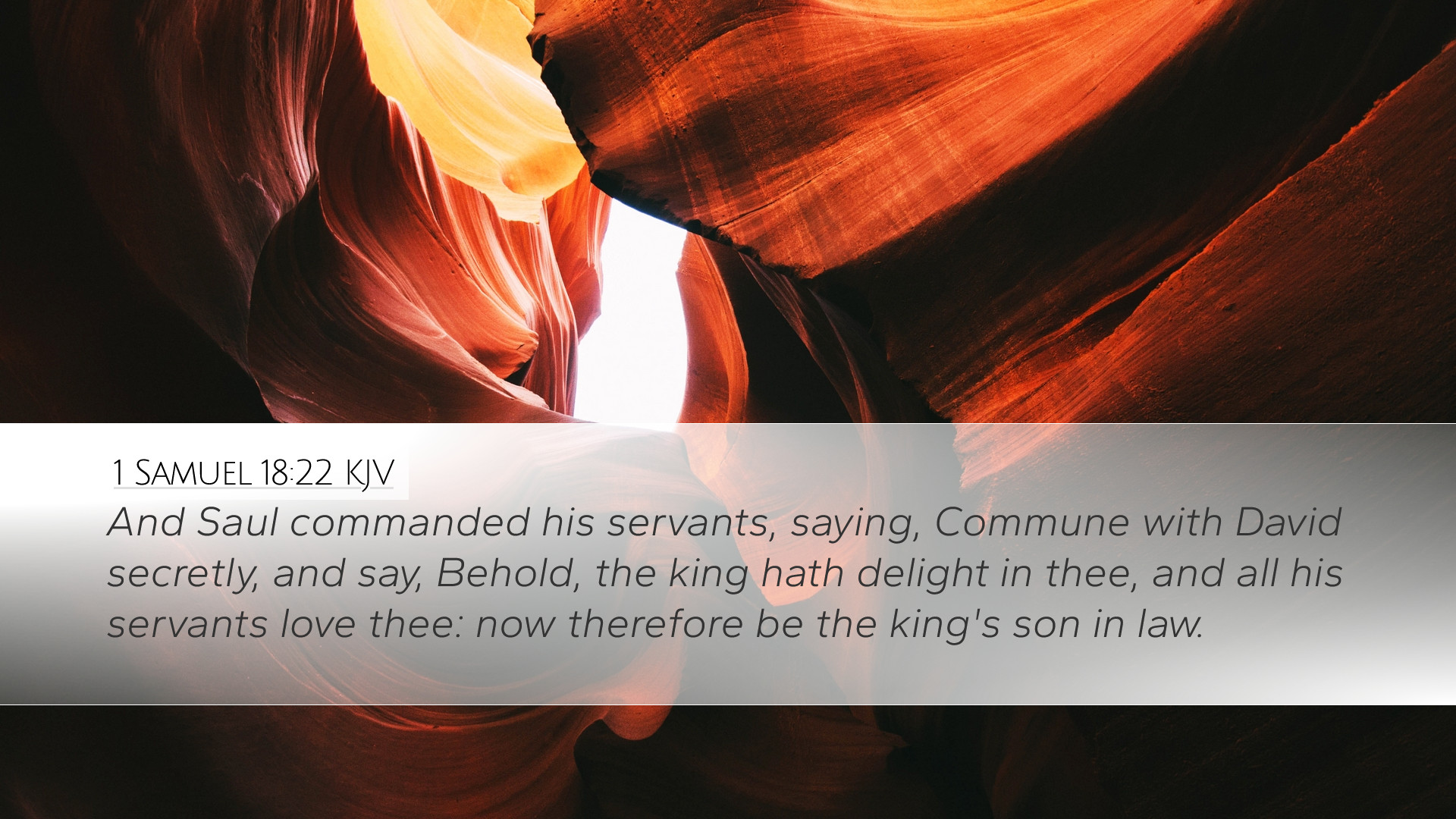Commentary on 1 Samuel 18:22
Text of 1 Samuel 18:22 (KJV): "And Saul commanded his servants, saying, Commune with David secretly, and say, Behold, the king hath delight in thee, and all his servants love thee: now therefore be the king's son-in-law."
Introduction
The relationship between Saul and David is a complex narrative filled with themes of jealousy, friendship, and the sovereign will of God. This specific verse marks a turning point in Saul's perception of David. In this commentary, we draw insights from prominent public domain commentators to explore the implications of Saul's command and the layers of meaning within this verse.
Contextual Analysis
Before delving into the verse, it is critical to understand the backdrop of 1 Samuel 18. Following David's victory over Goliath, he becomes a national hero. Saul, initially impressed with David, begins to see him as a rival due to the people's songs celebrating David's accomplishments over his own. Thus, Saul's command in 1 Samuel 18:22 reflects his complex emotions—both admiration and burgeoning jealousy.
Saul's Desire for David as a Son-in-law
Saul's intentions are revealed in this verse. He desires to bring David into his family, possibly as an attempt to control or manipulate him. Matthew Henry notes that Saul's request to his servants to communicate his desire to David was perhaps a means of trapping David within the royal household. Henry elaborates that Saul had shifted from viewing David as a brave companion to seeing him as a political pawn.
Psychological Dynamics
Adam Clarke offers a perspective on Saul's state of mind. He suggests that Saul’s command could be interpreted as a desperate attempt to win David’s favor back. Saul’s love for David is no longer pure; instead, it is tainted with ulterior motives. Saul’s hope is that by creating a familial bond, he could mitigate the threat he feels from David's rising popularity.
The Role of Human Relationships
1 Samuel 18:22 encapsulates the intricate dynamics of human relationships within leadership contexts. Albert Barnes emphasizes that Saul's actions reveal the manipulative nature of political relationships. By proposing David's marriage to his daughter, Saul inadvertently creates a deeper, albeit contentious, personal relationship that can affect national unity. This brings forth the notion that relationships in leadership carry heavy responsibilities and implications.
Communal Relationships and Societal Support
The verse emphasizes communal relationships as Saul mentions that “all his servants love thee.” This statement reveals two facets: the loyalty of Saul’s servants toward David and the solidarity forming around David among the people. Matthew Henry points out that David’s qualities had won him the affection of many, potentially stirring further jealousy in Saul, which may lead one to question the nature of loyalty in a time of political strife.
Theological Reflections
This verse and its surrounding context provide rich ground for theological reflection, particularly concerning the sovereignty of God over human affairs. Saul’s machinations and desires serve to highlight God’s overarching plan for David’s future as king. Adam Clarke argues that despite Saul's schemes, God's purpose will triumph. This underscores the biblical assertion that human actions, even those driven by envy, cannot thwart divine intention.
The Dichotomy of Power
The power dynamics in play must also be considered. Saul, as king, believes he retains ultimate authority over David and his destiny, yet his anxiety reveals his deep-seated insecurity. This reflects a broader theme in Scripture regarding the true nature of power and authority: it rests ultimately with God, and human leadership is fraught with challenges when it becomes self-serving.
- Jealousy and Control: Saul’s jealousy is a reminder of the pitfalls that come with power.
- Manipulation and Relationships: The attempts to manipulate relationships further complicate interactions.
- Divine Providence: God's plans are often at work through human actions, regardless of their intent.
Conclusion
1 Samuel 18:22 is not merely a verse about political maneuvering but a profound commentary on relationships and the profound truth of God's providence in the midst of human complexities. For pastors, students, theologians, and scholars, this scripture challenges us to reflect on how we engage in relationships, particularly in leadership settings, and the eternal truths that govern the affairs of men and nations.
In light of this verse, we are compelled to check our motives, seek genuine connections, and trust in the sovereign hand of God as we navigate the intricate landscape of human relationships.


